Related Research Articles

Honolulu is a city magazine covering Honolulu and the Hawaii region. It dates back to 1888 when it was called Paradise of the Pacific. It is the oldest magazine in the state of Hawaii and is the longest published magazine west of the Mississippi. Honolulu is a member of the City and Regional Magazine Association (CRMA).
The Big Five was the name given to a group of what started as sugarcane processing corporations that wielded considerable political power in the Territory of Hawaii during the early 20th century, and leaned heavily toward the Hawaii Republican Party. The Big Five were Castle & Cooke, Alexander & Baldwin, C. Brewer & Co., Theo H. Davies & Co., and American Factors. The extent of the power that the Big Five had was considered by some as equivalent to an oligarchy. Attorney General of Hawaii Edmund Pearson Dole, referring to the Big Five, said in 1903: "There is a government in this Territory which is centralized to an extent unknown in the United States, and probably almost as centralized as it was in France under Louis XIV."
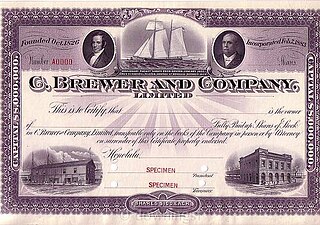
C. Brewer & Co., Ltd. was a Honolulu-based company that was once part of the Big Five companies in territorial Hawaii. The company did most of its business in agriculture.

The Hawaii Consolidated Railway (HCR), originally named the Hilo Railroad Company, was a standard gauge common carrier railroad that served much of the east coast of the island of Hawaiʻi from 1899 until 1946, when a tsunami destroyed part of the line.

Theophilus Harris Davies was an English businessman. He was the founder of Theo H. Davies & Co., one of Hawaii's "Big Five" sugar firms.

Hāmākua is a district on the northeast coast of Hawaiʻi's Big Island, administered by the County of Hawaiʻi in the state of Hawaiʻi. It is also the name given for the coastline in the region, the "Hāmākua Coast".

Sugarcane was introduced to Hawaiʻi by its first inhabitants in approximately 600 AD and was observed by Captain Cook upon arrival in the islands in 1778. Sugar quickly turned into a big business and generated rapid population growth in the islands with 337,000 people immigrating over the span of a century. The sugar grown and processed in Hawaiʻi was shipped primarily to the United States and, in smaller quantities, globally. Sugarcane and pineapple plantations were the largest employers in Hawaiʻi. Today the sugarcane plantations are gone, production having moved to other countries.
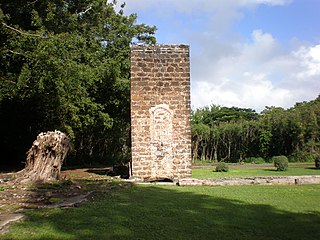
The Old Sugar Mill of Kōloa was part of the first commercially successful sugarcane plantation in Hawaiʻi, which was founded in Kōloa on the island of Kauai in 1835 by Ladd & Company. This was the beginning of what would become Hawaii's largest industry. The building was designated a National Historic Landmark on December 29, 1962. A stone chimney and foundations remain from 1840.
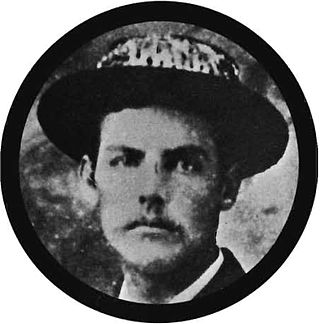
William Herbert Purvis was a plant collector and investor in a sugarcane plantation on the island of Hawaiʻi during the late nineteenth century.
Hawaii is one of the few U.S. states where coffee production is a significant economic industry – coffee is the second largest crop produced there. The 2019–2020 coffee harvest in Hawaii was valued at $102.9 million. As of the 2019-2020 harvest, coffee production in Hawaii accounted for 6,900 acres of land.
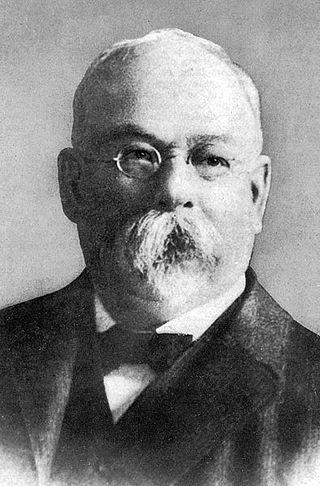
Henry Perrine Baldwin was a businessman and politician on Maui in the Hawaiian Islands. He supervised the construction of the East Maui Irrigation System and co-founded Alexander & Baldwin, one of the "Big Five" corporations that dominated the economy of the Territory of Hawaii.
Ladd & Company was an early business partnership in the Kingdom of Hawaii. Its founders were William Ladd (1807–1863), Peter Allen Brinsmade (1804–1859), and William Northey Hooper (1809–1878). The company was behind the first commercial sugarcane plantation and first international land speculation in the Hawaiian Islands.
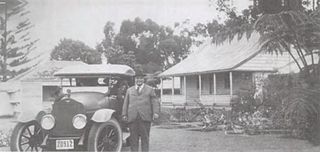
James Frank Woods was a major landowner during the Kingdom of Hawaii who was related to royalty and many civil leaders.

Samuel Gardner Wilder was an American shipping magnate and politician who developed a major transportation company in the Kingdom of Hawaii.

William Lowthian Green was an English adventurer and merchant who later became cabinet minister in the Kingdom of Hawaii. As an amateur geologist, he published a theory of the formation of the Earth called the tetrahedral hypothesis.
Pāʻauhau is an unincorporated community on the island of Hawaiʻi in Hawaiʻi County, Hawaiian Islands. Pāʻauhau is located near the north coast of the island, 2 miles (3.2 km) east-northeast of Honokaʻa.

Alexander Young was a mechanical engineer and politician in the Kingdom of Hawaiʻi.

Spreckelsville is an unincorporated community on the northeastern coast of the west side of the island of Maui in the U.S. state of Hawaii.

Joseph Ballard Atherton (1837–1903) was a Honolulu businessman and a former president of Castle & Cooke. He was a member of the Annexation group, which overthrew the Kingdom of Hawaii. He was the founder of Honolulu YMCA. Atherton was a member of both Kalākaua's Privy Council of State and Liliʻuokalani's Privy Council of State.
Francis S. Morgan was a Hawaiian businessman, president of the Kualoa Ranch and Hamakua Sugar Company.
References
- ↑ Richard A. Greer (1998). "Along the Old Honolulu Waterfront". Hawaiian Journal of History. Vol. 32. Hawaii Historical Society. pp. 53–66. hdl:10524/430.
- 1 2 3 4 Edward Greaney (1976). "Hawaii's big six: A cyclical Saga" (PDF). The Encyclopedia of Hawaii, a 1976 Bicentennial Project. The University of Hawaii Press.
- ↑ "Davies Pacific Center". web site. Pacific Office Properties Trust, Inc. 2008. Retrieved 2010-03-07.
- ↑ Hollie, Pamela G. (1984-03-01). "A Gamble on Sugar in Hawaii". The New York Times. ISSN 0362-4331 . Retrieved 2018-04-22.
- ↑ Mary Adamski. "Believer in Big Isle sugar dies". Honolulu Star-Bulletin.
- ↑ "Hamakua's Peace with Bank Is Bought At High Cost to State, Other Creditors". Environment Hawai`i. 1993-02-08.
- ↑ Erika Engle (October 19, 2003). "Rumored sales of Theo Davies' businesses may signal its end". Honolulu Star-Bulletin . Retrieved 2009-07-31.
- ↑ eengle@starbulletin.com, Erika Engle (2004-08-11). "TheoDavies restaurants sold to company in California - A notice says that the buyers will retain all 2,289 employees with pay and benefits". Honolulu Star-Bulletin (HI). Retrieved 2018-04-22– via NewsBank.